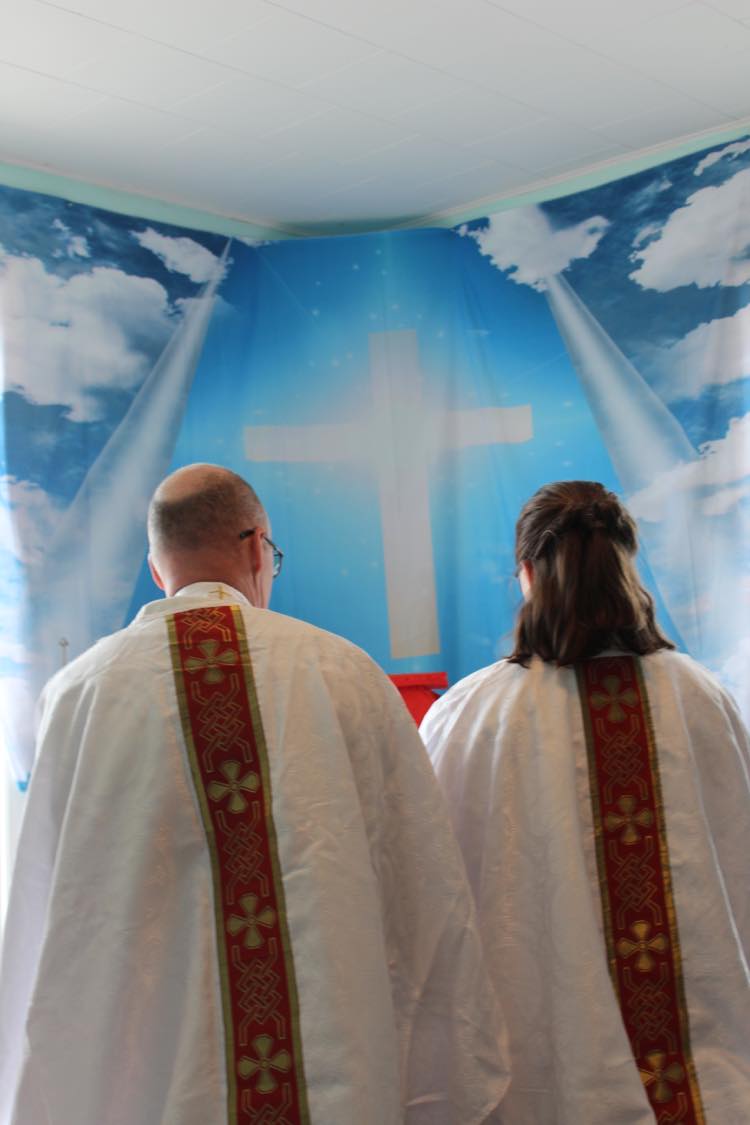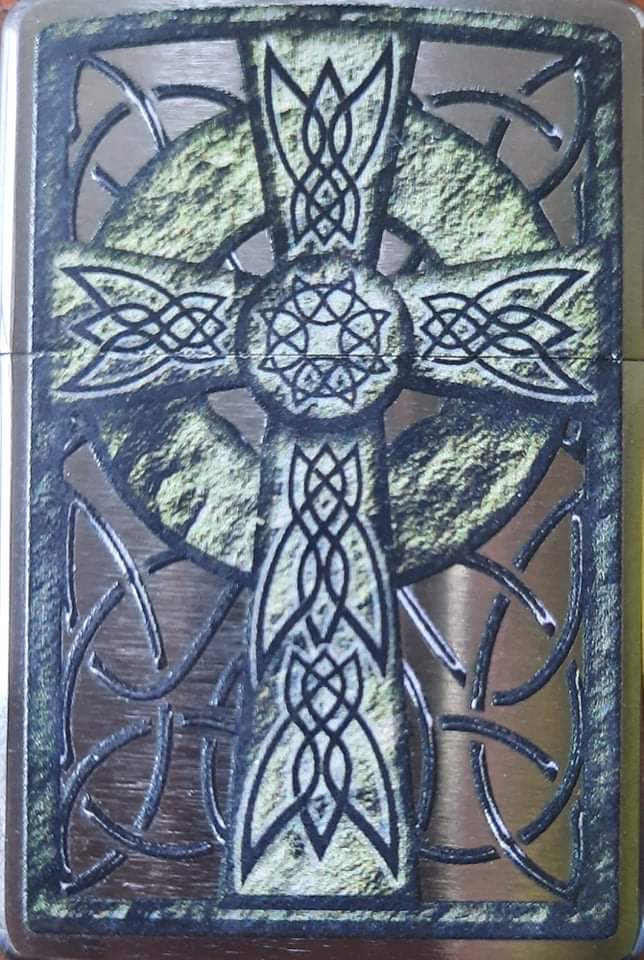- Home
- Seminary Studies
Simply Catholic and Welcoming You
St. Brigit's Seminary Studies
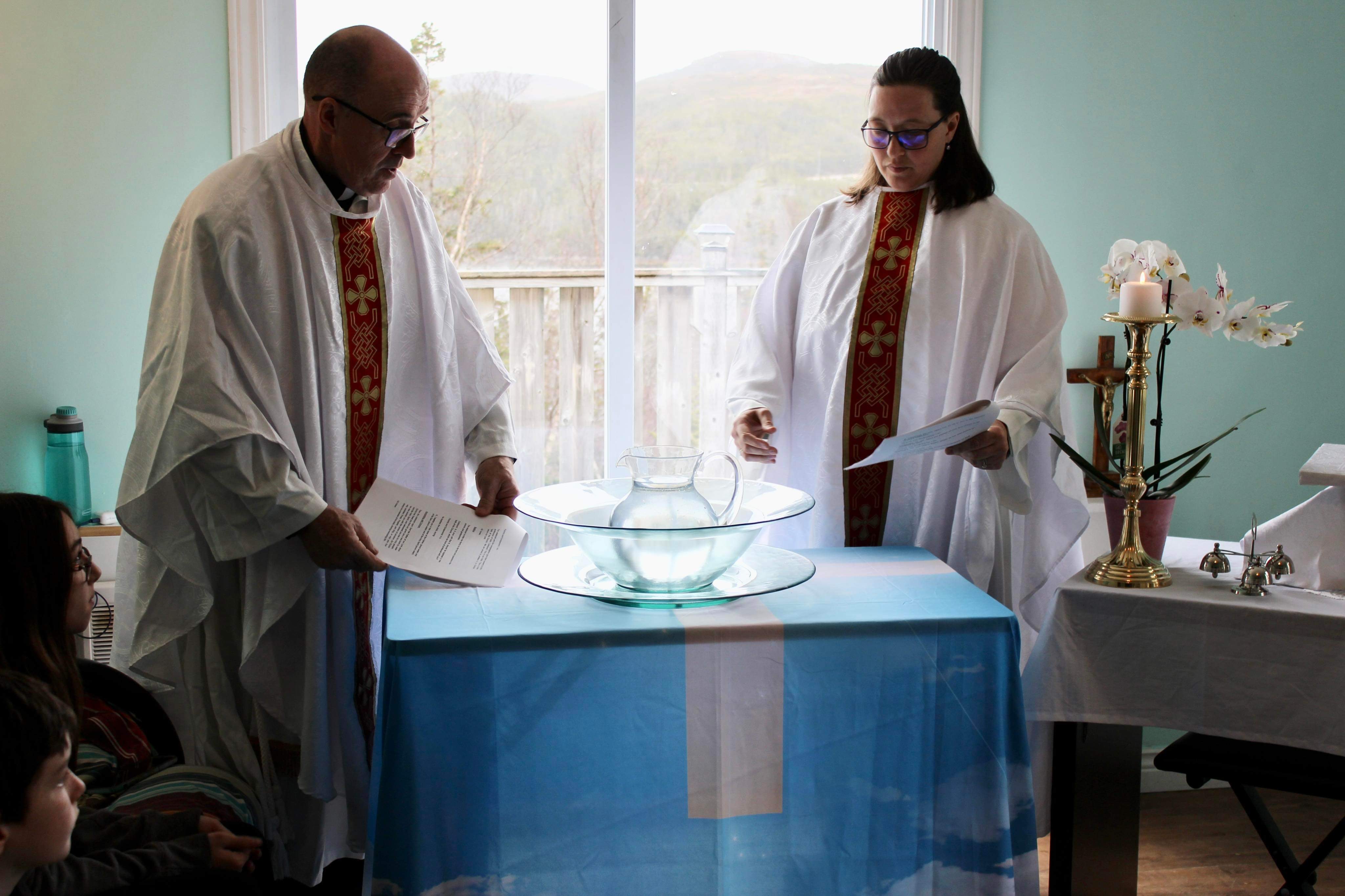
Two Priests Preparing for a Baptism
St. Brigit's Seminary Studies are provided to ensure a basic level of understanding and practicum training to clergy candidates to St. Brigit's Community Catholic Church and for candidates with Concordat Churches seeking to share our training rather than have to come up with their own system of studies.
St. Brigit's Seminary Studies will be online to train those who feel the call to ministry. We do NOT charge a fee for such training. Seminary training will be provided on an as and when needed basis. We will offer training via a combination of downloadable files, training videos and online, face to face classes. We will be delighted to work in person whenever possible.
We will use two books as reference works;
The Practice of Preaching, Revised Edition by Paul Scott Wilson (Homiletic s)
Catholicism by Richard P. McBrien, Study Edition
Wilson's book is currently $45 new and McBrien's sell at right around $100. Both can be found on the used markets. Our copies of Catholicism were less than $30 each.
At St. Brigit's Seminary Studies we are not interested in replicating any of the wonderful accredited academic options already out there. These are prohibitively expensive, usually requiring sponsorship by larger church establishments.
Our aim is more along the traditional lines of an apprenticeship with ongoing training and mentoring even as the candidate continues to progress through the stages of ministry. This allows, indeed encourages candidates to have an active ministry even as they continue to learn. This also makes becoming clergy achievable for anyone who feels the call to ministry.
We seek to provide a sufficient academic/basic knowledge of scriptures and the faith AND hands on, delivery of the actual sacraments pertinent to that clergy members standing at the time. In person when possible or via social media classes when that is the option available.
Clergy should be given the skills to deliver each of the sacraments before being expected to do so. In plain language, a deacon or priest should be able to perform all their duties to an acceptable level of competence, BEFORE they are ordained. They should not be set up to be embarrassed after their ordinations. Still each deacon should be encouraged to develop an active ministry even while continuing to study to become a priest.
Successful candidates of St. Brigit's Seminary Studies will be ordained with full Apostolic Succession and Valid Orders (be that as sub deacon, deacon or priest and even as bishop for those to whom this applies).
St. Brigit's Seminary Studies for Sub Deacons
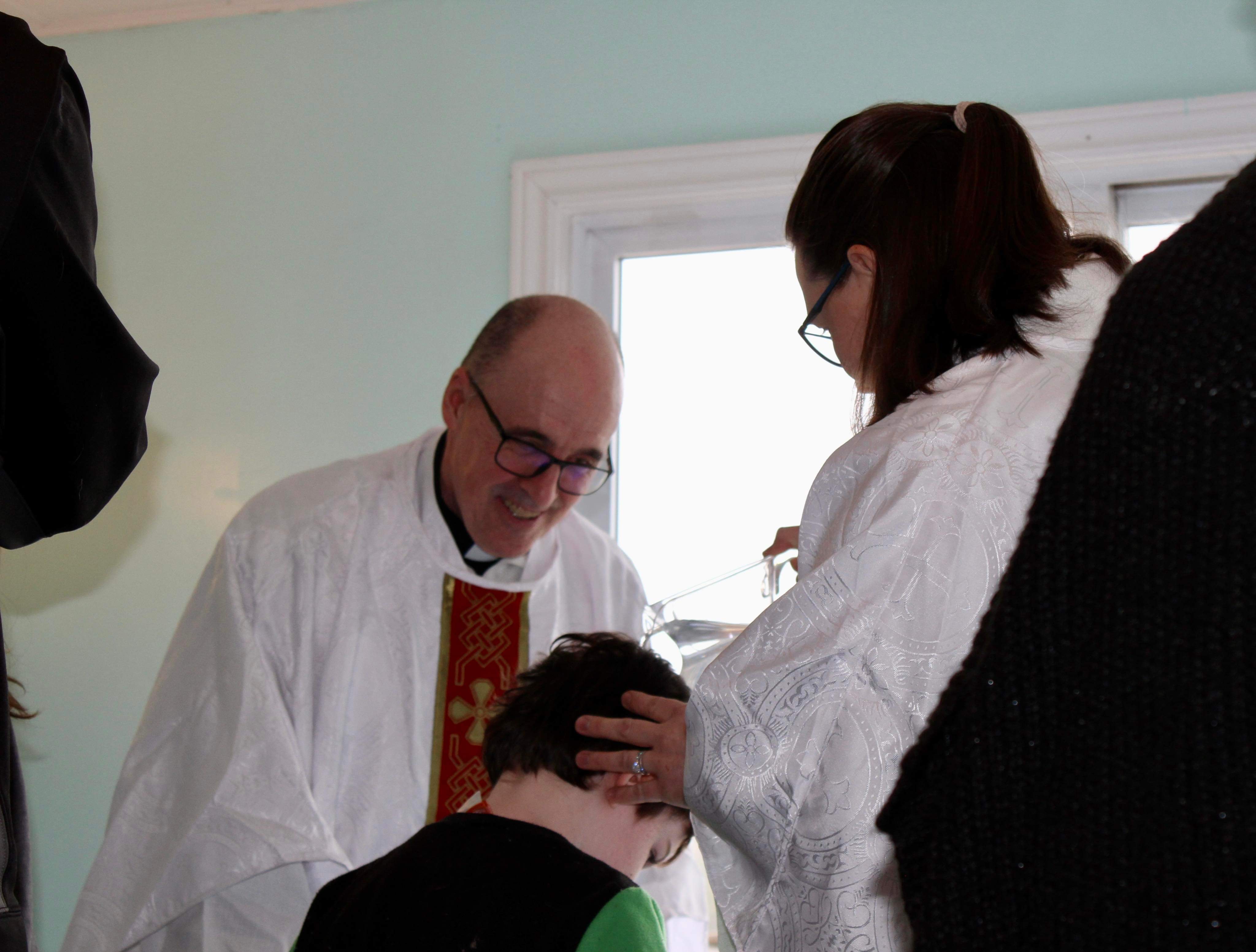
A Youth Being Baptized by Pouring
Sub deacons/Chaplains are our first level of clergy and more than just a step towards the diaconate or the priesthood. For us this is very much a practical step into clergy and a strong and necessary calling in it's own right.
Wedding planners, funeral directors and venue operators sometimes opt to become sub deacons specifically and only in order to become their own, in house, clergy marriage commissioners. The only restriction they face by doing this is that sub deacons cannot say the full mass.
Instead they say a "Deacons Mass" consisting of the "Liturgy of the Catechumens" and, instead of the "Liturgy of the Eucharist" they lead some prayers and distribute Eucharists previously consecrated by a priest or bishop to meet their needs.
St. Brigit's Community Catholic Church is happy to welcome otherwise suitable candidates to fulfill this role. Those wishing to become sub deacons for this reason must still pass police safety checks and be active Christians.
Legally and for church purposes, clergy marriage commissioners must be properly ordained ministers in the church.
The sub deacon level of clergy can be the most interactive within the congregation at large and are generally the most aware of the needs of congregation members.
For these reasons in St. Brigit's Seminary Studies training for sub deacons is intended to provide a very practical understanding of this calling with the academics focusing on understanding the basic functionality of the church, their role in it, self-care and our catholic charism. The practicum portion of sub deacon training focuses on empowering them to carry out their role and duties effectively.
Do note these are subject headings and brief descriptions only. Each area will have specific detailed study materials and/or practicum sessions.
Study areas include (without being limited to):
The information on this website.
This website has been written as a resource of information to inform and educate laity and clergy alike. As a lay person you may wish to know more about us and our particular expression of the catholic faith. You may have come here looking for clergy marriage commissioners, other sacraments or a better understanding of what those sacraments are and what they are meant to do for each of us.
As clergy or those looking to join us as clergy, this website is intended to give you a solid knowledge of who we are, our expression of faith, what we offer potential clergy as well as our expectations for clergy and churches/parishes wishing to join or associate with us.
This site is set up with a home page and several pages on the navigation bar, referred to as T2 pages. Each of these T2 pages have links to sub pages under them known as T3 pages,accessed via on page/in content links. In turn some of these have T4 sub pages under them accessed via links within those pages. Things like the actual Rite of Baptism show up as T5 pages, since it is likely that only clergy will be looking for these pages.
For example, the Home page is followed by the About Us page (T2) which then has five T3 pages (so far) followed by seven T4 pages. These are your basic information pages followed by pages of specific details on each subject matter including;
St. Brigit's Community Catholic Church Charism
Clergy Ethical Standards, followed by Clergy Information Records and reports including a master report for monthly and annual reporting.
Human Resources Considerations, hiring, dismissal compensation/pay etc. followed by records management, W.S.I.B. and O.H.S.A., Reporting abuse, sexual misconduct policy, screening in faith policy, the rights of a parish priest and more.
Documenting all of this material is a huge undertaking which will continue for the foreseeable future. This will be augmented with training videos on the practical requirements essential for clergy, which we will shortly begin to release on You Tube.
As clergy or future clergy with St. Brigit's Community Catholic Church you will be expected to be familiar with all of these materials. This website is developed such that candidates can learn the materials posted here at their own pace and proceed more formally when ready.
Being clergy and running a parish is not simply a matter of being familiar with scriptures and getting ordained. There are essential knowledge and skills requirements such as actually officiating sacraments the administration of a parish, spiritual counseling and the ethical, legal and human resources need to know aspects of both administration and simply being clergy.
Being Simply Catholic:
Emphasizing our faith and discipleship NOT denominations
Not Being a Burden to our Congregation - Starts with being an unpaid clergy. Not taking up a collection plate. Focus on gathering the faithful over owning buildings. Funeral directors and wedding planners do pay clergy. St. Brigit’s Community Catholic Church does NOT pay clergy.
Clergy in every home - not just a wonderful concept, an achievable goal.
Being Simply Catholic is also part of why we choose to be a ‘house church’ gathering in our homes, schools or rental properties like halls, storefronts etc. or sharing church space where appropriate, all over buying traditional church buildings.
We may buy traditional church buildings when circumstances indicate it and funds permit it. We just don’t emphasize owning real estate to use mostly once a week and then burden our congregations with all of the associated costs to own such structures.
Growing the Church without ‘proselytizing’ - Building Relationships of Trust. Most people do not appreciate someone from a different church from their own knocking on their door or stopping them in the street to then attempt to 'swing them over to some other church'. These tactics do work and we are not criticizing those who employ them. This just isn't our way of spreading the gospel.
We believe that if we live out our faith with love and sincerity, then those persons in our circle of influence, who are interested in why our faith matters so much to us and we never push it on them will be more inclined to make their own inquiries of us if only precisely because we never try to push it onto them.
We also quite literally have no vested interest in which denomination of Christianity other people choose. To us, that is simply your expression of the same love of Christ that we espouse. It doesn't have to be the same as ours for you to walk with Christ and live as He calls you to do!
We are supposed to be able to recognize Christians by 'their love for one another'. Not by their enmity, jealousy or judgments over differences in denominations/expressions of that espoused Christianity.
All of the above subjects are well covered throughout this website so it is sufficient to simply list them here and ask you to read the detailed pages on this site.
Self Care - an absolute requirement for all clergy. For our overview of Self Care for Clergy please click here.
St. Brigit’s Community Catholic Church Charism - our unique expression of the catholic faith. This material is on this website in two parts. Part one is the introduction to Charism on our About us page and part two is linked from that section to a separate, detailed page, reached by clicking on the link on the About Us page or go there directly by clicking here.
Homiletics (using The Practice of Preaching, Revised Edition by Paul Scott Wilson) For more information on our Homiletic studies please click here.
The Rosary - a daily devotion for clergy and laity alike. Different versions and the mysteries involved. Please see the pages on the rosary in the simply catholic section.
Practicum training - in person or online training to ensure candidates can competently conduct their duties to preach, teach, baptize, officiate at/witness marriages, and conduct funeral liturgies.
Role:
Sub Deacons are ordained to assist deacons, priests and bishops in ministry, focusing on works of service and charity.
Duties:
Assisting with baptisms, preaching, and other duties associated with mass.
Serving as assistants to bishops.
May preach, teach, baptize, witness marriages, and conduct funeral liturgies. Initially under the mentorship of a senior priest or bishop.
This is the practicum portion of training and may be done in person/mentorship or via online media such as Face Time, You Tube, Zoom, etc. as part of distance learning.
What can sub deacons NOT do?
In the Catholic Church, sub deacons, while ordained, cannot celebrate Mass, hear confessions, or anoint the sick, as these are functions reserved for priests and bishops.
Sub deacons are ordained, but not to the same extent as priests or deacons. While they are in holy orders, the sub diaconate is considered a sacrament of Minor Orders while deacons and priests are ordained to Major Holy Orders.
Specific functions they cannot perform:
Celebrating Mass: Sub deacons cannot consecrate the bread and wine into the Body and Blood of Christ, as this is a function reserved for priests.
Hearing Confessions: They cannot hear confessions or offer absolution, a function reserved for priests.
Anointing the Sick: Sub deacons cannot administer the sacrament of anointing of the sick, which is also reserved for priests and bishops.
While the role of the sub deacon is well established as a ‘training position’ towards becoming a deacon or priest, some people feel called specifically to this level and may choose to remain there permanently or until such times as they feel ready and called to ‘advance’ further.
This list may be added to as needs or study areas are identified.
St. Brigit's Seminary Studies for Deacons
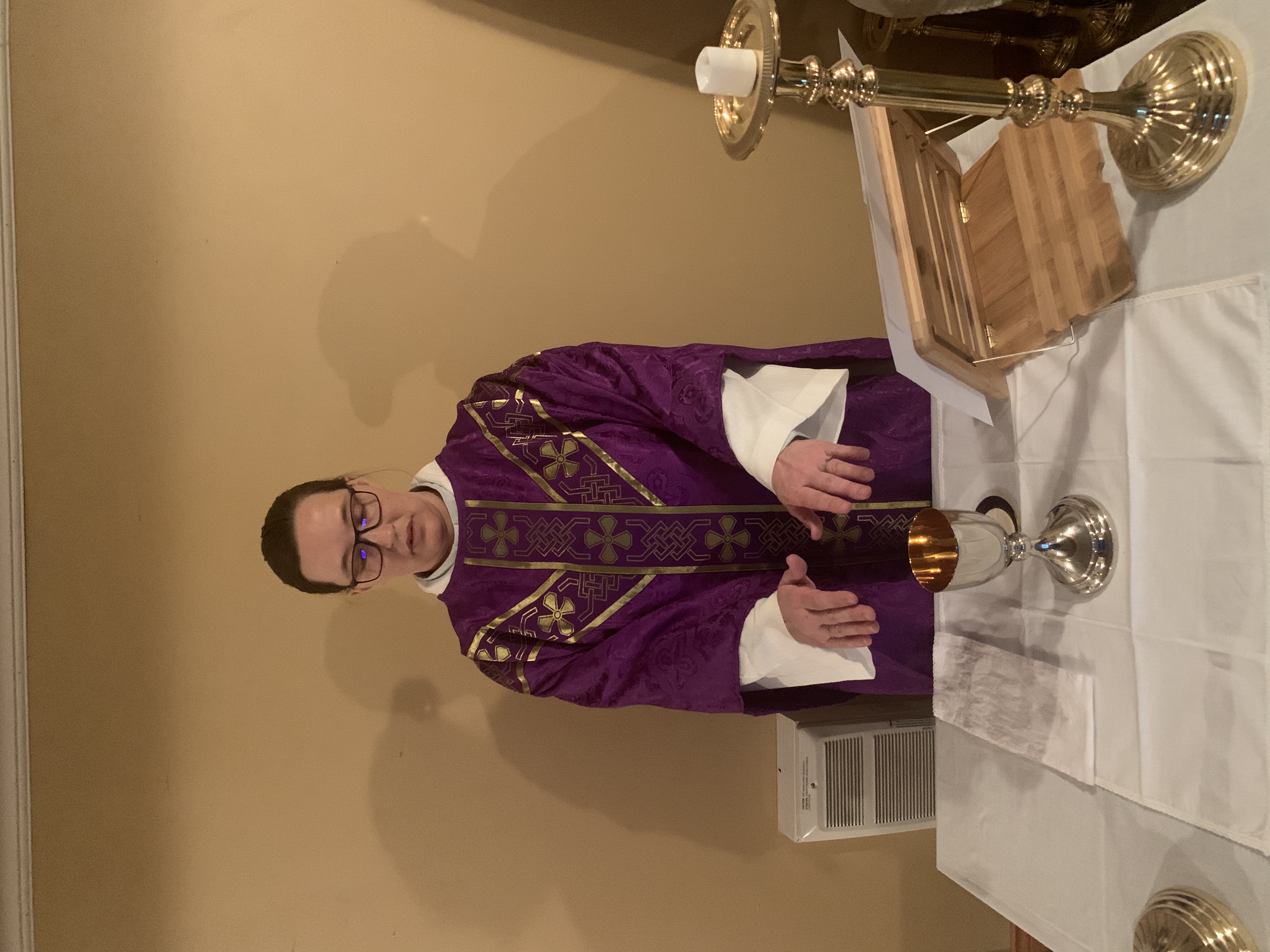
Amma Charlene Performing the Eucharistic Liturgy During Mass
St. Brigit's Seminary Studies for the Diaconate/being a deacon - understanding this clergy calling, what it entails and the responsibilities and importance of this calling in each ‘parish’ and in the church as a whole. This is where the balance of training starts the shift from an emphasis on practical matters to church canons, rules and regulations and more spiritual pursuits.
Study areas include (without being limited to):
Stages of Spirituality Please click here.
The Didache (From the Apostolic Fathers) Please click here.
Theological Issues in Catholicism Please click here.
Catholic Church Canon Law and Regulations Please click here.
Clergy Sacramental Confidentiality Issues Please click here.
Sacramental Liturgy and Practicum We will provide You Tube and Zoom training for each of the sacramental liturgies to ensure competency in officiating at each.
Homiletics (using The Practice of Preaching, Revised Edition by Paul Scott Wilson) Now switching from study and theory to writing and delivering your own homilies.
Orientation Course on the Theology and Charism of St. Brigit’s Community Catholic Church and those churches with which we have a Concordat. The written academics for these areas are on this website already and we will host Zoom meetings for interactive discussions on these areas.
Ordination Candidacy Study (Self Examination of call to Diaconate/Priesthood)
This list may be added to as needs or study areas are identified.
Role:
Deacons are ordained to assist priests and bishops in ministry, focusing on service and charity.
Duties:
Assisting with baptisms, preaching, and other duties associated with mass.
Serving as assistants to priests, bishops and archbishops.
May preach, teach, baptize, witness marriages, and conduct funeral liturgies. Again the practicum here may be in person/mentorship or online/distance learning.
Deacons may also Bless icons and articles.
What can a Deacon NOT do?
In the Catholic Church, deacons are ordained ministers but cannot celebrate Mass, hear confessions, offer absolution, or anoint the sick, as these are functions reserved for priests.
Here are the specific functions a deacon cannot do:
Celebration of the Eucharist: Deacons do not have the authority to celebrate the Full Mass or confect the Eucharist (consecrate the bread and wine into the Body and Blood of Christ). NOTE: In the absence of a priest a deacon may be authorized to offer a Deacons Mass where they say the Mass of the Catechumens and distribute hosts confected by a priest.
Confession and Absolution: Deacons do not hear confessions or offer absolution (forgiveness of sins).
Anointing of the Sick: The sacrament of the anointing of the sick, which includes the forgiveness of sins, is not within the purview of deacons.
Administering Confirmation: Deacons cannot administer the sacrament of confirmation.
While deacons can officiate at/witness a marriage, the couple are the ministers of the sacrament, not the priest or deacon.
As with sub deacons there are people who feel called specifically and only to this clergy position as deacons and they are free to do so. For most this position offers an opportunity to serve as ordained ministry while studying and preparing for priesthood.
St. Brigit's Seminary Studies for Priests
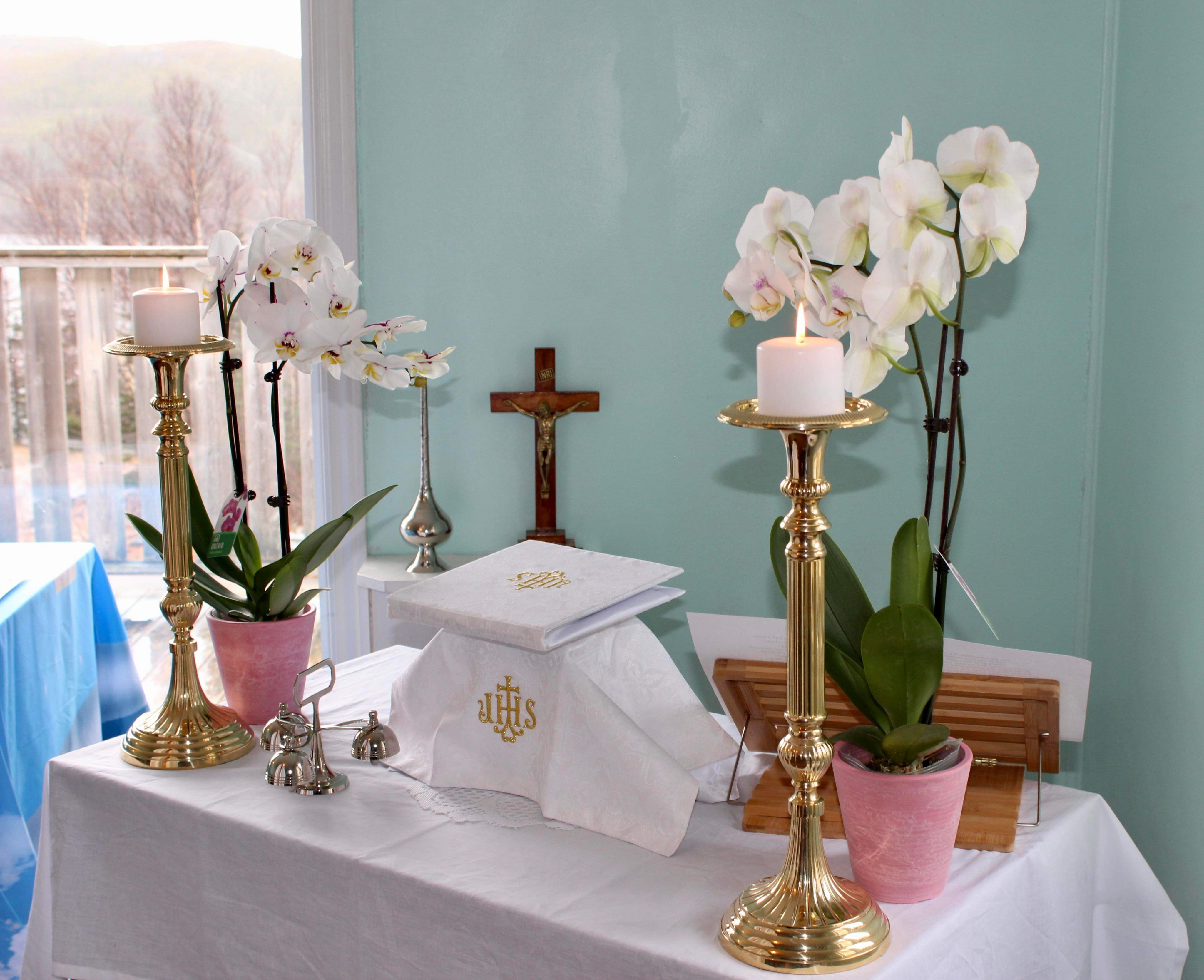
An Altar Ready to Commence Catholic Mass
With St. Brigit's Seminary Studies for Priests, the basic text book used is Catholicism, by Richard McBrien, HarperSanFrancisco:1994. (New Edition). While not a canonically accepted work, this book does a very good job at covering all the basics of catholic studies. For our purposes it needs only to be augmented with our in house materials presented in the previous study levels or added at this point.
Study areas include (without being limited to):
Catholic Theological Foundations Please click here.
Catholic Theological Philosophy – Human Existence. Please click here.
Catholic Doctrine Please click here.
Comparative Religions Please click here.
Christology Please click here.
Church History with specifics on the Old Catholic Church and St. Brigit's Community Catholic Church origins. Please click here.
Catholic Ecclesiology (The Church) Please click here.
Catholic Sacramental Theology Please click here.
Morality and Ethics
Spirituality
Mary and the Saints
Eschatology (End Times)
Stages of Spirituality
Apostolic Fathers – The Didache
Systematic Theology including canon law
Advanced Sacramental Confidentiality.
Priesthood is Servant-hood - we’re not about being authority figures. Being a disciple of Christ is to be a servant of Christ and we are never more in the service of God than when we are in service to our fellow man. For details please click here.
The Divine Office also called the Liturgy of the Hours - daily clergy devotions.
Formal Application with References
This list may be added to as needs or study areas are identified.
Role:
Priests are ordained to preach, celebrate sacraments, and lead the faithful.
Duties:
Celebrating daily Mass.
Hearing confessions.
Giving spiritual direction.
Anointing and visiting the sick.
Teaching catechism to children and adults.
Baptizing.
Witnessing marriages.
Performing funerals and burials.
Bless icons, articles, places, people and any living thing
What Functions as Clergy can a Priest NOT do?
A priest cannot perform ordinations. Ordinations to any clergy position can only be performed by a bishop. For any Catholic ordination or consecration to take place and be valid it must be by the laying on of hands by a bishop who is themselves properly consecrated in an unbroken tactile line of Apostolic Succession and Valid Priesthood Orders. (In other words 'mail order' and 'online' ordinations are simply NOT valid in the catholic faith.)
A priest cannot provide 'confirmation' except by the direction of their bishop and such permission is only valid for the time and place indicated by the bishop. This is not 'carte blanche' and the priest cannot continue to confirm unless given separate and specific permission to do so again in another stated time and place by the bishop.
Monsignors are sometimes appointed by their bishops to assist with confirmations or to conduct them on behalf of the bishop and this permission may be specific or general until retracted by the bishop.
Priests are still deacons and continue to fulfill that role as needed
St. Brigit's Seminary Studies for the Episcopate
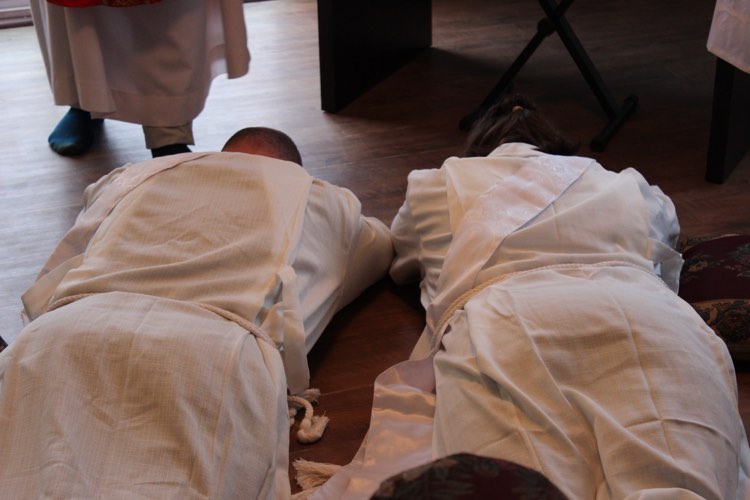
Priesthood Ordinations for Two Priests
For St. Brigit's Seminary Studies it would not be appropriate to stop training at the level of priests. The Episcopate our Bishops, the Spiritual Directors and servants of all also need both experience and training to perform their duties effectively.
In many ways their priesthood experience, combined with mentorship of their predecessor bishops makes up most of their training with some necessary additions to ensure all the bases are covered.
For the purpose of this writing it is sufficient to highlight the roles and duties of bishops and archbishops.
Bishops
Role:
Bishops are the primary pastoral leaders of a diocese, responsible for the spiritual well-being of their flock.
Duties:
Providing pastoral and administrative governance for a diocese.
Ordaining priests and deacons.
Presiding over diocesan councils and synods.
Ensuring the faithful are well-cared for and that the Church's teachings are upheld.
Bishops continue to be priests and to fulfill the role of priest
All Bishops sit on the College/Council of Bishops to ensure uniformity of core beliefs, even though actual delivery of their ministry may more closely approximate their own church of origin in terms of liturgy, vestments, etc.
Archbishop
Role:
Archbishops oversee a larger area or province of dioceses, called an archdiocese, often with additional responsibilities beyond those of a bishop.
Duties:
Similar to bishops, but with a broader scope of responsibility.
May be appointed to lead a metropolitan area or a group of dioceses.
Being an Archbishop in this church is not viewed as some sort of promotion. An Archbishop is simply the Bishop of an Archdiocese or larger metropolitan area and usually requires other bishops to assist them in their duties. They may also have been elected by fellow bishops to provide spiritual direction and administrative leadership. In many matters they will withhold their vote unless there is a tie.
All Bishops/Archbishops sit on the College/Council of Bishops to ensure uniformity of core beliefs, even though actual delivery of their ministry may more closely approximate their own church of origin in terms of liturgy, vestments, etc.
Recent Articles
-
Catholic-Confession
Apr 19, 25 08:53 PM
Full breakdown of the Catholic Confession Sacrament of Reconciliation -
Ordination, incardination and dismissal of clergy
Mar 03, 25 06:47 PM
Overview of Ordination to Holy Orders, incardination and dismissal of clergy -
Catholic Last Rites
Mar 03, 25 06:41 PM
An explanation of the Catholic Last Rites and Anointing of the Sick
